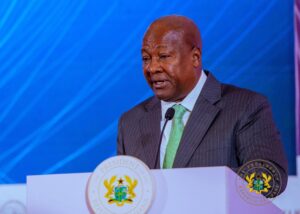By Juliet ETEFE ([email protected])
President John Dramani Mahama has reaffirmed his administration’s commitment to fiscal discipline as the cornerstone of the country’s economic recovery and transformation.
Speaking at the 9th CEO Summit held in Accra under the theme ‘Leading Ghana’s economic reset: Transforming business and governance for a sustainable, futuristic economy’, the President emphasised that maintaining fiscal discipline and conducive environment for businesses to thrive remains a top priority for the government.
He, therefore, outlined an eight-pillar economic reset plan aimed at rebuilding confidence, restoring macroeconomic stability and fostering inclusive growth.
President Mahama said the first step is to complete the ongoing International Monetary Fund (IMF) programme with strict adherence to expenditure controls and borrowing limits.
“We will continue the discipline in government expenditure and borrowing and work to achieve all targets under the Extended Credit Facility with the IMF. We expect to conclude the fourth review of the IMF programme in June 2025, with a target to exit at the end of the programme in 2026.
“And thereafter, we will participate in Article 4 consultations and adopt the policy support instrument framework, signalling Ghana’s return to responsible, non-borrowing engagement with the fund,” he stated.

The second pillar focuses on reopening domestic and international capital markets to responsible borrowing for commercially viable projects.
“We are working to reopen Ghana’s foreign markets in collaboration with the IMF and our development partners, the Ghana Stock Exchange, and local banks. However, future borrowing will be linked to self-financing commercially viable projects, particularly by Ministry, Department and Agency (MDAs); Metropolitan, Municipal and District Assemblies (MMDAs); and State-Owned Enterprises (SOEs), ensuring value for money and sustainable repayment,” he added.
The third, the President said, is strengthening sovereign funds and local government financing. This includes amendment of the Public Financial Management Act and the Constitution to make contributions to the sinking and stabilisation funds mandatory.
“We also intend to empower MMDAs to issue infrastructure and municipal bonds secured against a portion of their District Assemblies Common Fund to fund infrastructure projects such as roads, schools, water systems and local industry at local government level,” he added .
President Mahama also highlighted efforts to clear verified government arrears and rationalise public investment through better auditing and commitment controls.
He emphasised the importance of accelerating public financial management reforms, including reactivating the Treasury Single Account, real-time budget monitoring tools and the Integrated Tax Administration System.
The sixth pillar targets revitalising exports through the Ghana Exim Bank, with specific investments in non-traditional exports such as agro-processing and high-value tree crops like oil palm, cocoa, cashew and shea. He expressed confidence in Ghana’s ability to build stronger reserves and foreign exchange buffers, especially with rising global demand for gold and cocoa.
On the seventh pillar, the President revealed plans to position Ghana as a regional hub for trade and investment in West Africa, linked through improved ports, financial services, digital infrastructure and the African Continental Free Trade Area (AfCFTA).
The final pillar centres on resuming infrastructure development through innovative financing, including public-private partnerships.
Private sector role
Emphasising the central role of the private sector, President Mahama pledged to maintain a stable macroeconomic environment that supports business expansion and investment.
“This reset will only succeed with the private sector at its core. We will ensure policy predictability to enable medium and long-term planning for you. Access to credit and capital markets will not crowd you out,” he assured.
In line with this vision, he announced the establishment of a bi-annual national business consultative platform to facilitate dialogue between government and the private sector. “You will not only be consulted in major government policy – you will be empowered to take advantage of it,” he added.
The President also commended businesses that have responded to the cedi’s appreciation by reducing prices and urged others to follow suit.
“The time has come for us to lift the gloom, to restore confidence and to build again. Ghana is open for business again,” he declared.
For his part, Ernest De-Graft Egyir, Founding CEO of the Chief Executives Network Ghana, emphasising the strategic importance of the 9th Ghana CEO Summit & Expo as a catalyst for country’s economic reset, commended government’s support for the business community.










